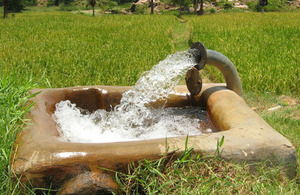DFID Research: Mitigating agricultural water pollution
Research examines the impact of pollution on agricultural water quality.

Rice field irrigation
Agricultural pollution of water supplies in large-scale irrigation schemes in Egypt and Sri Lanka was studied by researchers from Mott MacDonald, with the aim of:
- understanding the causes of diffuse pollution
- analysing the impacts that this has on water quality
- assessing the effect on livelihoods, especially the livelihoods of the poor, and
- proposing solutions where appropriate
Pesticides have been detected in fish and other agricultural produce in Egypt and Sri Lanka; sedimentation as a result of intensive irrigated agriculture has destroyed important coastal lagoon fisheries in Sri Lanka; and misuse of pesticides is a significant cause of death and disease in Sri Lanka. The threat to livelihoods caused by agricultural pollution could be reduced by better irrigation and chemical management.Objective data was required on the impact of agrochemicals on water quality and this needed putting into the context of other hazards (and benefits) of using chemicals.
Pollution of water is more difficult to determine than other forms of pollution because of its diffuse nature, and although there have been many studies on surface water pollution and links with agricultural practices, its effect on the environment and on people’s livelihood strategies and outcomes are less well understood.The project has led to development of a package of 4 interventions which can benefit people’s livelihoods. The measures recommended include technical training; development of guidelines for best management practices; legislation and regulation of use of chemicals; and monitoring compliance with regulations and recommended practices.
The benefits of this project have so far been to policy developers, and those monitoring water quality and designing agricultural extension programmes. In the medium term, rural waters users will derive a benefit from reduced exposure to potentially dangerous agrochemicals. Indirect benefit will also be obtained, through data provision, by those supporting irrigating agriculture, for example government agencies, community organisations, and even agrochemical suppliers.
In relating water quality to livelihoods, this study is unique and it is the rural poor, in closest contact with agrochemicals, who will ultimately benefit from this focussed study.
More information
See DFID project record Identifying sustainable options for the mitigation of agricultural pollution